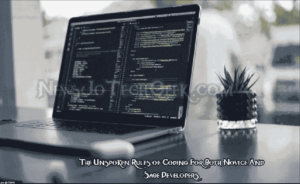Introduction
Coding is more than just typing lines of instructions into a computer. It’s an intricate art where discipline, problem-solving, and teamwork intersect.
However, many essential practices and principles in coding aren’t explicitly taught. These “unspoken rules” are often learned through experience and can greatly impact your career, whether you are just starting or have years of experience.
This article will walk you through the nuanced principles every developer, from novice to expert, needs to know to write better code and collaborate efficiently.
Why Understanding Unspoken Rules is Crucial for Developers
Unwritten rules often hold the most power. They help foster good habits, prevent common pitfalls, and ensure codebases remain maintainable in the long run.
Without these rules, even the most talented developers can fall into traps like unreadable code, poor collaboration habits, or burnout.
Whether you are a newbie writing your first line of code or a seasoned veteran polishing complex algorithms, knowing these principles ensures that your code is efficient, understandable, and secure.
Key Differences Between Novice and Experienced Developers
Mindset Shifts from Beginner to Expert
Novices are eager to learn but may focus solely on solving the immediate problem. In contrast, experienced developers adopt a long-term mindset, thinking about maintainability, scalability, and collaboration.
How Novices Approach Coding vs. Seasoned Developers
Beginners often write code that works, while experts write code that is understandable and efficient. Experienced developers also aim to reduce technical debt, avoiding solutions that create future problems.
Writing Clean and Readable Code
The Importance of Naming Conventions

Good code should explain itself. Using meaningful variable names can make a difference between code that is easy to maintain and code that feels like a puzzle.
CamelCase vs. snake_case Explained
Choose a consistent style across your project. CamelCase (myVariableName) is common in JavaScript, while Python favors snake_case (my_variable_name).
Commenting Thoughtfully Without Overdoing It
When and Where to Use Comments
Comments should clarify why something is done, not what is being done. If the code itself is self-explanatory, comments are unnecessary.
Avoiding Redundant Comments
Bad:
Python
- x = 10 # Assign 10 to x
Python
- x = 10 # Default timeout value in seconds
Version Control and Collaboration Etiquette
Writing Meaningful Commit Messages
Each commit should describe what and why a change was made. Example:
git commit -m “Fix login bug by adding input validation”
Respecting Other Developers’ Code Contributions
Use respectful language during code reviews and avoid unnecessary changes just for stylistic preferences.
Debugging Efficiently – The Silent Art
Learning to Love the Process of Debugging
Debugging is an inevitable part of development. Treat it as an opportunity to learn, not as a chore.
When to Seek Help vs. Going Solo
Knowing when to ask for help can save time. If you’re stuck for hours, it’s okay to seek advice.
Security Considerations Every Developer Should Follow
Avoiding Hard-Coding Sensitive Information
Never store passwords or API keys directly in your code. Use environment variables instead.
Basic Security Practices for All Developers
Adopt practices like input validation and encryption early on to prevent vulnerabilities.
Testing Code and the Art of Not Skipping Steps
Unit Tests and Integration Tests
Testing isn’t optional. Unit tests validate individual parts of your code, while integration tests ensure components work together.
Why “It Works on My Machine” Isn’t Enough
Testing across environments ensures your code works universally.
Continuous Learning: A Developer’s Lifelong Journey
Staying Updated with Latest Technologies
Tech evolves fast. Regular learning is essential to stay relevant in your career.
Importance of Networking with Fellow Developers
Engage with other developers through forums, meetups, or conferences to stay inspired and share knowledge.
Code Reviews: Giving and Receiving Feedback Gracefully
Constructive feedback improves code quality. Be humble when receiving feedback and thoughtful when giving it.
Balancing Innovation with Practicality in Code
While creativity is essential, practical solutions are often more sustainable. Avoid over-complicating your code just to show off.
Handling Burnout and Staying Motivated in Coding
Long hours of coding can drain even the most passionate developers. Take breaks, exercise, and find hobbies outside coding to recharge.
Final Thoughts on Navigating the Developer Journey
The journey from a novice to a seasoned developer is filled with challenges and growth.
The unspoken rules discussed here are essential tools to help you write better code, collaborate effectively, and maintain a healthy mindset.
Whether you’re a beginner or a pro, adopting these principles will help you thrive in the coding world.
Conclusion
Mastering the unspoken rules of coding isn’t just about technical skills, it’s about developing a mindset that prioritizes collaboration, readability, security, and sustainability.
By following these principles, you can ensure long-term success in your career.
FAQs
1. What is the most important rule in coding?
Always write readable and maintainable code.
2. How can beginners improve their coding skills?
Practice consistently, seek feedback, and engage with the coding community.
3. Why are comments important in code?
They clarify the intent behind complex logic, making future maintenance easier.
4. What is the best way to avoid burnout as a developer?
Take breaks, manage workload, and maintain hobbies outside of work.
5. Is learning new programming languages necessary for developers?
Yes, it helps you stay relevant and adapt to new technologies.




